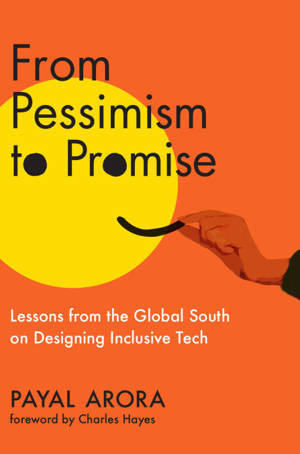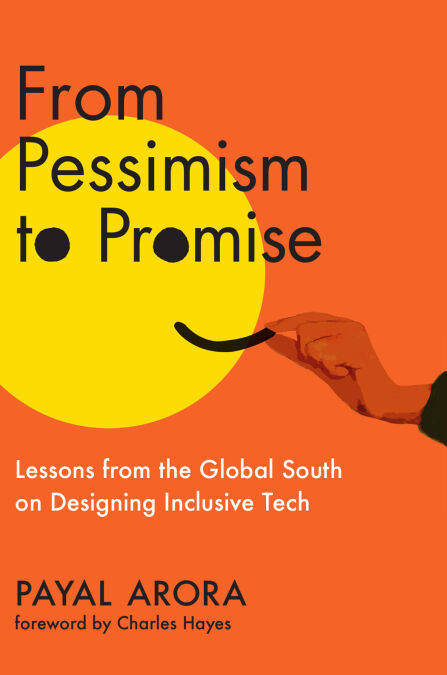
- Retrait gratuit dans votre magasin Club
- 7.000.000 titres dans notre catalogue
- Payer en toute sécurité
- Toujours un magasin près de chez vous
- Retrait gratuit dans votre magasin Club
- 7.000.0000 titres dans notre catalogue
- Payer en toute sécurité
- Toujours un magasin près de chez vous
From Pessimism to Promise EBOOK
Lessons from the Global South on Designing Inclusive Tech
Payal Arora
Ebook | Anglais
26,56 €
+ 26 points
Format
Description
A radical paradigm shift in the way we think about AI and tech, taking hope and inspiration from the aspirational users of new technologies around the world.
When it comes to tech, the mainstream headlines are bleak: Algorithms control and oppress. AI will destroy democracy and our social fabric, and possibly even drive us to extinction. While legitimate concerns drive these fears, we need to equally account for the fact that tech affords young people something incredibly valuable—a rare space for self-actualization. In From Pessimism to Promise, award-winning author Payal Arora explains that, outside the West, where most of the world’s youth reside, there is a significant different outlook on tech: in fact, there is a contagion of optimism toward all things digital. These users, especially those in marginalized contexts, are full of hope for new tech.
As AI disrupts sectors across industries, education, and beyond, who better to shine the light forward, Arora argues, than the Global South, the navigator of all manner of forced disruptions, leapfrogging obstructive systems, norms, and practices to rapidly reinvent itself? Drawing on field insights in diverse global contexts such as Brazil, India, and Bangladesh, Payal describes what drives Gen Z to embrace new technologies. From Pessimism to Promise discusses the shift to relationally-driven approaches to design; how to create “algorithms of aspiration”; how to reimagine the digital space for sex, pleasure, and care; and, what we can learn from feminist digital activists and women’s collectives in the Global South on shared digital provenance and value, as well as indigenous approaches to sustainability, that challenges sacred ideas on degrowth, circular economy, and the doughnut economy. Arora also takes heart in the power in numbers, as the users from the majority world infuse algorithms with everyday aspirations, pushing for a new digital order.
Timely and urgent, From Pessimism to Promise makes a deeply compelling case that it is not naïve to be optimistic about our digital future. On the contrary, it is our moral imperative to design with hope.
When it comes to tech, the mainstream headlines are bleak: Algorithms control and oppress. AI will destroy democracy and our social fabric, and possibly even drive us to extinction. While legitimate concerns drive these fears, we need to equally account for the fact that tech affords young people something incredibly valuable—a rare space for self-actualization. In From Pessimism to Promise, award-winning author Payal Arora explains that, outside the West, where most of the world’s youth reside, there is a significant different outlook on tech: in fact, there is a contagion of optimism toward all things digital. These users, especially those in marginalized contexts, are full of hope for new tech.
As AI disrupts sectors across industries, education, and beyond, who better to shine the light forward, Arora argues, than the Global South, the navigator of all manner of forced disruptions, leapfrogging obstructive systems, norms, and practices to rapidly reinvent itself? Drawing on field insights in diverse global contexts such as Brazil, India, and Bangladesh, Payal describes what drives Gen Z to embrace new technologies. From Pessimism to Promise discusses the shift to relationally-driven approaches to design; how to create “algorithms of aspiration”; how to reimagine the digital space for sex, pleasure, and care; and, what we can learn from feminist digital activists and women’s collectives in the Global South on shared digital provenance and value, as well as indigenous approaches to sustainability, that challenges sacred ideas on degrowth, circular economy, and the doughnut economy. Arora also takes heart in the power in numbers, as the users from the majority world infuse algorithms with everyday aspirations, pushing for a new digital order.
Timely and urgent, From Pessimism to Promise makes a deeply compelling case that it is not naïve to be optimistic about our digital future. On the contrary, it is our moral imperative to design with hope.
Spécifications
Parties prenantes
- Auteur(s) :
- Editeur:
Contenu
- Nombre de pages :
- 200
- Langue:
- Anglais
Caractéristiques
- EAN:
- 9780262380133
- Date de parution :
- 02-09-24
- Format:
- Ebook
- Protection digitale:
- Adobe DRM
- Format numérique:
- ePub

Les avis
Nous publions uniquement les avis qui respectent les conditions requises. Consultez nos conditions pour les avis.






